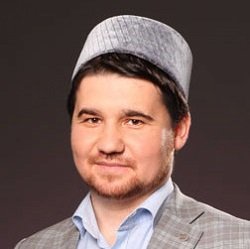How open theatres today to plays about Islam?
A play-installation about the status of Muslim women will be shown in Kazan
This week, it has become known that a tour of Kosmos theatre centre from Tyumen takes place in Kazan at the MOÑ theatre venue. On August 19, the audience will be presented with the production of The Wall, as stated — this is an installation about Islamic feminism. About why the authors turned to this topic and how open theatres are today to plays of Muslim themes — read in the material of Realnoe Vremya.
“The problem of the oppressed status of women lies not in the 'awfulness' of religion, but in the patriarchal interpretation”
“The 2622 year. There are no prohibitions left for women in the Islamic world. The viewer is present at the funeral of a robot of a Muslim woman who still carries these stereotypes," the description of the installation play is intriguing. The author of the project, Madina Omarova, told Realnoe Vremya that she was inspired to create the installation by thoughts about the position of women in Islam.

Omarova was born and raised in a Muslim family. She is Avar by nationality and says she has never faced oppression comparable to the situation in Afghanistan. But there were a lot of things she didn't understand then.
According to Madina Omarova, religion is sometimes interpreted too traditionally, which can lead to difficulties for women and the establishment of stereotypes that are difficult to destroy later.
“It always seemed to me that Islam is a light religion that protects women, but in fact, it has never been so. Subsequently, I realised that the problem of the oppressed status of women lies not in the “awfulness” of religion, but in the incorrect (patriarchal) interpretation of its Ayahs. Another problem is traditionalism. People don't understand where religion begins and tradition ends, so everything has become part of Islam — both bad and good. There are many stereotypes around Islam and feminism. With the installation The Wall, director Rinat Tashimov and I tried to break them.
The representatives of MOÑ theatre site told Realnoe Vremya that the plays for the exchange tours were chosen by the supervisors of Kosmos theatre centre from Tyumen. On August 18, the audience will also have the opportunity to see the autofiction play “Aelita. Inventory”, which addresses the problems of memory and the need to store it.
“A new generation should come who will be able to engage in Islamic theatre”
According to theatre critic Niyaz Iglamov, the Islamic theme in the theatre is not developing very actively today. Russian-speaking theatres are not interested in it, and theatres in Muslim regions are more sensitive to religion and try not to bring religious issues to discussion.
As Iglamov notes, in Russia, Islam is not very reflected in art, literature, and theatre. So far, the producers and carriers of some meanings are only members of the Ummah, but this does not reach a wider audience.

At the same time, the theatre critic is sure that the prospects for the development of Islamic theatre art in Russia are huge, and this field is not yet plowed at all. According to Iglamov, for the development of this topic, it is necessary that one or two generations change:
“The bulk of the age-old actors today, formed during the Soviet years, are people of secular ideas. In Soviet times, in Tatarstan — Islam was somewhere in the villages, in the cities — it was closely watched. Several generations of actors used to draw meanings and ideas from other spheres. A new generation should come who will be able to engage in Islamic theatre.
Speaking about the installation of The Wall, Niyaz Iglamov notes that he does not expect anything revolutionary from this production, at the same time, he draws attention to that there are certain prerequisites for changing attitudes towards Islamic issues in the theatre:
“What we are seeing now are harbingers of changes, but it is not yet clear where exactly they will lead. As for this production about a robot, I know about Kosmos Centre in Tyumen, I am well acquainted with the director, Alexandrina Shakleeva, but I think that this kind of art should be born inside the ummah, inside believers, then it will make sense. I have not seen this play, but I am afraid that it may be a look from the outside, a look of Miklukho-Maklay at the indigenes. Maybe it's not.”
It is necessary to separate the concepts of Islamic and Muslim art
Islamologist, publicist and public figure Rustam Batrov shared with Realnoe Vremya the opinion that the topic of Islam is presented in the theatre quite widely. As an example, he cites the production of “Monsieur Ibrahim”, which could be seen by the audience of the Theatre on Bulak and the Young Spectators Theatre. Both classical and modern productions are presented.

At the same time, Batrov notes that cases of resentment of the Muslim public and claims to certain theatrical productions have been observed earlier as well.
“There was a production at the Tinchurinsky Theatre about dekulakisation, a playbased on Soviet patterns. There was mocking humour over religion, Galimjan Barudi was occasionally shown in an unsightly light. At the same time, the mocking humour was unjustified, without context. Criticism must have some kind of basis, some kind of focus. At the level of social networks, there were outrages among the Muslim public after this incident.”
To avoid outrage over the control of art coverage of religious issues, Batrov suggests separating the concepts of Muslim and Islamic theatres.
“A similar discussion arose in the context of the Muslim film festival, I was a member of the selection committee there. We decided for ourselves that there is the Islamic cinema, and there is the Muslim one. Islamic is what is done according to the canons, the lives of saints, the prophet, as it should ideally be, as it is drawn in sacred books. And Muslim cinema reflects the life of Muslims as it is in reality. With all the problems, with alcoholism, and with obscenities. Muslim is a broader frame than Islamic. This concept can also be projected onto theatrical art. After all, the theatre does not pretend to build a textbook on the teachings of Islam on the stage, they touch on different topics and interpret them in different ways.
As Batrov emphasises, the problem of the position of women in Islam is one of those that should be raised, including in art.
“I've recently launched the project 'Islam differently', an approach to the study of Islam, through culture, and, to my surprise, I was just inundated with letters in personal messages with all the stories that husbands beat, bully, do not support wives, divorce and abandon women with children. And these are stories from religious people. Of course, women have the right to vote.
“Religion in its medieval interpretation carries the suppression of women”
Rustam Batrov notes that the manifestations of feminism can be quite different. Even wearing a headscarf in a secular society can be considered a struggle for their rights.
“Hijabs that urban women consciously wear are actually a protest against society. This is not the same hijab or paranja that we see in Central Asia or in traditionalist Arab societies, where women are forcibly forced to put it on. In urbanised societies, hijab is a sign of feminism. A woman struggles to be a person so that she is not perceived as a sexual object. Hijab is a challenge. Girls in hijabs are very often not yielding and downtrodden, as is commonly believed, they are brisk and have a ready tongue.
The publicist emphasises that, in a certain interpretation, religion can be a tool for suppressing women, which makes the problem itself even more urgent.
“We often think in a formulaic way that feminism is necessarily an anti-religious movement, that you need to take off your headscarf or perform on the square with bare breasts. I would love to go to this production, I try to keep track of such things, I don't know in what sense feminism will be presented there. In fact, religion in its medieval interpretation carries the suppression of women. Women often sound the alarm from the position in which they are driven by men. When they are forbidden to work or go to social networks.
And all this is cemented by religious arguments, and the woman cannot object to anything, she is immediately answered by Ayahs and hadiths interpreted in the right way. And she has to suffer.